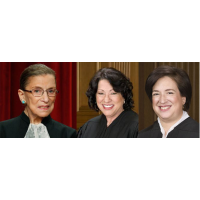Female Justices Object to Unsigned Supreme Court Order Favoring Christian College’s Objection to Birth Control Compromise
 Supreme Court Justices Ruth Bader Ginsburg, Sonia Sotomayor and Elena Kagan
Supreme Court Justices Ruth Bader Ginsburg, Sonia Sotomayor and Elena Kagan
Only days after issuing the controversial Hobby Lobby ruling that exempted some businesses from providing certain types of birth control in its insurance plans, the U.S. Supreme Court produced an unsigned opinion supporting a Christian college’s right to ignore other provisions of the Affordable Care Act dealing with birth control.
Justices Sonia Sotomayor, Ruth Bader Ginsburg and Elena Kagan clearly took exception to the court’s decision by male justices to issue an injunction at least temporarily exempting Wheaton College in Illinois from having to follow Obamacare regulations mandating that employers with a religious objection to providing birth control submit a form declaring that objection. When forms are submitted, third parties are then authorized to provide birth control to the insured.
The court endorsed Wheaton’s refusal to use mandatory forms for the transfer on the grounds that they led indirectly to the use of birth control. Like some other Christian institutions, the college objects to providing, directly or indirectly, intrauterine devices and morning-after pills on grounds that they amount to forms of abortion, an opinion at odds with medical practice.
Sotomayor wrote in response to the opinion that the court had undermined its own ruling in the Hobby Lobby case, which upheld the use of the forms. “Those who are bound by our decisions usually believe they can take us at our word,” she said. “Not so today.”
Sotomayor added that the opinion “undermines confidence in this institution,” and that it could be used by other nonprofit religious organizations that share Wheaton’s concerns.
“The issuance of an injunction in this case will presumably entitle hundreds or thousands of other objectors to the same remedy,” she said.
Wheaton based its suit on the Religious Freedom Restoration Act of 1993, which covers religious practices subjected to a “substantial burden.” Sotomayor disagreed that Wheaton suffered such a burden. “Let me be absolutely clear. I do not doubt that Wheaton genuinely believes that signing the self-certification form is contrary to its religious beliefs. But thinking one’s religious beliefs are substantially burdened—no matter how sincere or genuine that belief may be—does not make it so,” Sotomayor wrote.
Justice Stephen G. Breyer, who joined the three women justices in the Hobby Lobby dissent, did not join them on the Wheaton case.
-Noel Brinkerhoff, Steve Straehley
To Learn More:
Birth Control Order Deepens Divide Among Justices (by Adam Liptak, New York Times)
Supreme Court Sides with Christian College in Birth Control Case (by Robert Barnes, Washington Post)
Wheaton College v. Sylvia Burwell (U.S. Supreme Court) (pdf)
Hobby Lobby Ruling Puts Rights of Employers above Rights of Employees (by Noel Brinkerhoff, AllGov)
- Top Stories
- Unusual News
- Where is the Money Going?
- Controversies
- U.S. and the World
- Appointments and Resignations
- Latest News
- Trump to Stop Deportations If…
- Trump Denounces World Series
- What If China Invaded the United States?
- Donald Trump Has a Mental Health Problem and It Has a Name
- Trump Goes on Renaming Frenzy






Comments